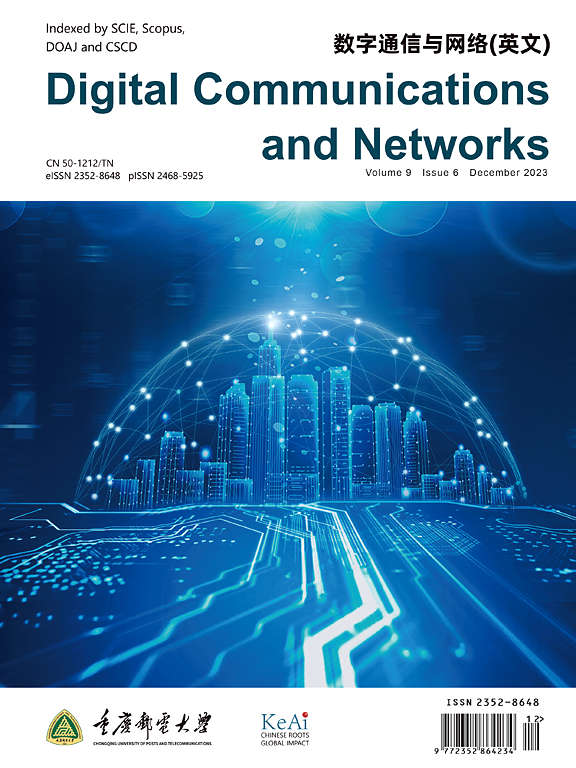MEC网络中移动VR传输的兴趣感知联合缓存、计算和通信优化
IF 7.5
2区 计算机科学
Q1 TELECOMMUNICATIONS
引用次数: 0
摘要
在即将到来的B5G/6G时代,基于无线的虚拟现实(VR)已经成为一种典型的应用,这是视频发展的必然趋势。然而,在沉浸式和交互式VR体验中,VR服务通常具有高延迟,同时对本地设备的能耗提出了挑战。针对这些问题,本文旨在提高边缘终端协同系统中虚拟现实服务的性能。具体而言,我们通过优化VR总交付延迟和本地设备能耗的加权和,制定了一个联合缓存、计算和通信(3C) VR服务策略问题。为了设计最优的虚拟现实服务策略,将优化问题解耦为三个独立的子问题分别求解。为了提高网络内的缓存效率,首先提出了一种基于bert的用户兴趣分析方法来准确表征内容请求行为。在此基础上,提出了考虑用户间性能公平性的服务成本最小最大化问题。然后,在给定通信资源分配的情况下,推导出每个用户的联合缓存和计算方案,并利用给定的联合缓存和计算策略信息获得基于切分的通信方案。通过备选优化,最终得到基于用户兴趣的联合3C最优策略。仿真结果证明了所提出的用户兴趣感知缓存方案的优越性,以及在考虑用户公平性的情况下联合3C优化策略的有效性。我们的代码可在https://github.com/mrfuqaq1108/Interest-Aware-Joint-3C-Optimization上获得。本文章由计算机程序翻译,如有差异,请以英文原文为准。
Interest-aware joint caching, computing, and communication optimization for mobile VR delivery in MEC networks
In the upcoming B5G/6G era, Virtual Reality (VR) over wireless has become a typical application, which is an inevitable trend in the development of video. However, in immersive and interactive VR experiences, VR services typically exhibit high delay, while simultaneously posing challenges for the energy consumption of local devices. To address these issues, this paper aims to improve the performance of VR service in the edge-terminal cooperative system. Specifically, we formulate a joint Caching, Computing, and Communication (3C) VR service policy problem by optimizing the weighted sum of the total VR delivery delay and the energy consumption of local devices. To design the optimal VR service policy, the optimization problem is decoupled into three independent subproblems to be solved separately. To improve the caching efficiency within the network, a Bert-based user interest analysis method is first proposed to accurately characterize the content request behavior. Based on this, a service cost minimum-maximization problem is formulated under the consideration of performance fairness among users. Then, the joint caching and computing scheme is derived for each user with a given allocation of communication resources while a bisection-based communication scheme is acquired with the given information on the joint caching and computing policy. With alternative optimization, an optimal policy for joint 3C based on user interest can be finally obtained. Simulation results are presented to demonstrate the superiority of the proposed user interest-aware caching scheme and the effectiveness of the joint 3C optimization policy while considering user fairness. Our code is available at https://github.com/mrfuqaq1108/Interest-Aware-Joint-3C-Optimization.
求助全文
通过发布文献求助,成功后即可免费获取论文全文。
去求助
来源期刊

Digital Communications and Networks
Computer Science-Hardware and Architecture
CiteScore
12.80
自引率
5.10%
发文量
915
审稿时长
30 weeks
期刊介绍:
Digital Communications and Networks is a prestigious journal that emphasizes on communication systems and networks. We publish only top-notch original articles and authoritative reviews, which undergo rigorous peer-review. We are proud to announce that all our articles are fully Open Access and can be accessed on ScienceDirect. Our journal is recognized and indexed by eminent databases such as the Science Citation Index Expanded (SCIE) and Scopus.
In addition to regular articles, we may also consider exceptional conference papers that have been significantly expanded. Furthermore, we periodically release special issues that focus on specific aspects of the field.
In conclusion, Digital Communications and Networks is a leading journal that guarantees exceptional quality and accessibility for researchers and scholars in the field of communication systems and networks.
 求助内容:
求助内容: 应助结果提醒方式:
应助结果提醒方式:


